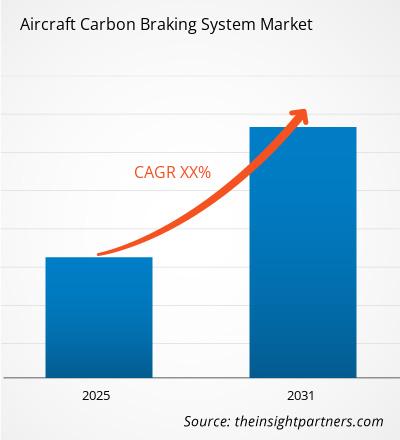MARKET INTRODUCTION
The carbon brake systems are becoming an integral and essential aircraft component that guarantees an aircraft's safety during ground operations, such as landing, take-off, including taxiing. With prospects in passenger aircraft, corporate jets, regional aircraft, and military aircraft, the future of the global aircraft carbon braking system market sounds promising. As a result, the demand for aircraft carbon braking systems is expected to expand at a decent CAGR globally.
MARKET DYNAMICS
Globally increasing high speed aircrafts and short distant dangerous runways are driving the growth of the aircraft carbon braking system market. However, the manufacturing costs of carbon brakes is expensive compared to other brakes such as steel brakes and this may restrain the growth of the aircraft carbon braking system market. Furthermore, the technological developments such as light weight and faster cooling down capability to promote the use of aircraft carbon braking system and this is further anticipated to create market opportunities for the aircraft carbon braking system market during the forecast period.
MARKET SCOPE
The "Global Aircraft Carbon Braking System Market Analysis to 2031" is a specialized and in-depth study of the aircraft carbon braking system market with a special focus on the global market trend analysis. The report aims to provide an overview of aircraft carbon braking system market with detailed market segmentation by aircraft type, application, fit type and geography. The global aircraft carbon braking system market is expected to witness high growth during the forecast period. The report provides key statistics on the market status of the leading aircraft carbon braking system market players and offers key trends and opportunities in the aircraft carbon braking system market.
MARKET SEGMENTATION
The global aircraft carbon braking system market is segmented on the basis of aircraft type, application and fit type. On the basis of aircraft type, the market is segmented as narrowbody jet, widebody jet, general aviation aircraft, military transport aircraft, fighter jets and trainers. Similarly, on the basis of application, the market is segmented as commercial aircraft, business jets, regional aircraft, and military aircraft. Also, based on fit type the market is further segmented as line fit and retrofit.
REGIONAL FRAMEWORK
The report provides a detailed overview of the industry including both qualitative and quantitative information. It provides overview and forecast of the global aircraft carbon braking system market based on various segments. It also provides market size and forecast estimates from year 2021 to 2031 with respect to five major regions, namely; North America, Europe, Asia-Pacific (APAC), Middle East and Africa (MEA) and South America. The aircraft carbon braking system market by each region is later sub-segmented by respective countries and segments. The report covers analysis and forecast of 18 countries globally along with current trend and opportunities prevailing in the region.
The report analyzes factors affecting aircraft carbon braking system market from both demand and supply side and further evaluates market dynamics effecting the market during the forecast period i.e., drivers, restraints, opportunities, and future trend. The report also provides exhaustive Porter's five forces analysis highlighting factors affecting the aircraft carbon braking system market in these regions.
MARKET PLAYERS
The reports cover key developments in the aircraft carbon braking system market as organic and inorganic growth strategies. Various companies are focusing on organic growth strategies such as product launches, product approvals and others such as patents and events. Inorganic growth strategies activities witnessed in the market were acquisitions, and partnership & collaborations. These activities have paved way for expansion of business and customer base of market players. The market players from aircraft carbon braking system market are anticipated to lucrative growth opportunities in the future with the rising demand for aircraft carbon braking system market. Below mentioned is the list of few companies engaged in the aircraft carbon braking system market.
The report also includes the profiles of key aircraft carbon braking system market companies along with their SWOT analysis and market strategies. In addition, the report focuses on leading industry players with information such as company profiles, components and services offered, financial information of last 3 years, key development in past five years.
- AAR
- CFCCARBON CO,. LTD
- Collins Aerospace, a Raytheon Technologies company
- Crane Aerospace & Electronics
- Honeywell International Inc.
- Meggitt PLC
- Mersen
- Safran group
- Nasco Aircraft Brake, Inc.
- Thermocoax
The Insight Partner's dedicated research and analysis team consist of experienced professionals with advanced statistical expertise and offer various customization options in the existing study.
Aircraft Carbon Braking System Report Scope
| Report Attribute | Details |
|---|---|
| Market size in 2024 | US$ XX million |
| Market Size by 2031 | US$ XX Million |
| Global CAGR (2025 - 2031) | XX% |
| Historical Data | 2021-2023 |
| Forecast period | 2025-2031 |
| Segments Covered |
By Aircraft Type
|
| Regions and Countries Covered | North America
|
| Market leaders and key company profiles |
- Historical Analysis (2 Years), Base Year, Forecast (7 Years) with CAGR
- PEST and SWOT Analysis
- Market Size Value / Volume - Global, Regional, Country
- Industry and Competitive Landscape
- Excel Dataset



Report Coverage
Revenue forecast, Company Analysis, Industry landscape, Growth factors, and Trends

Segment Covered
This text is related
to segments covered.

Regional Scope
North America, Europe, Asia Pacific, Middle East & Africa, South & Central America

Country Scope
This text is related
to country scope.
Trends and growth analysis reports related to Aerospace and Defense : READ MORE..
The List of Companies
1. AAR
2. CFCCARBON CO,. LTD
3. Collins Aerospace, a Raytheon Technologies company
4. Crane Aerospace and Electronics
5. Honeywell International Inc.
6. Meggitt PLC
7. Mersen
8. Safran
9. Nasco Aircraft Brake, Inc.
10. Thermocoax
1. AAR
2. CFCCARBON CO,. LTD
3. Collins Aerospace, a Raytheon Technologies company
4. Crane Aerospace and Electronics
5. Honeywell International Inc.
6. Meggitt PLC
7. Mersen
8. Safran
9. Nasco Aircraft Brake, Inc.
10. Thermocoax

 Get Free Sample For
Get Free Sample For